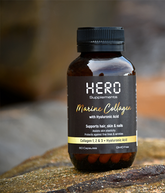What is marine collagen?
Marine collagen is a type of collagen derived from the skin, scales, and other parts of fish and other marine animals.
Here are the key points about marine collagen:
Marine collagen is a versatile biomaterial that is water-soluble, metabolically compatible, and highly accessible. It is a promising ingredient for various biomedical applications, including:
- Wound healing: Marine collagen can promote skin cell migration and vascularization, helping to heal skin injuries.
- Anti-aging: Marine collagen has been shown to improve skin elasticity and reduce wrinkles by stimulating collagen production in the skin.
- Bone regeneration: Marine collagen can increase bone mineral density, mineral deposition, and osteoblast (bone-forming cell) activity, making it beneficial for conditions like osteoporosis and osteoarthritis.
Marine collagen is typically extracted from the skin and scales of fish through a process called hydrolysis, which breaks down the collagen into smaller, more absorbable peptides. This makes marine collagen highly bioavailable and easily integrated into the body.
Compared to collagen from land animals, marine collagen is considered a more sustainable and environmentally-friendly source. It is often used in dietary supplements, cosmetics, and other health and beauty products to support skin, hair, nails, joints, and overall wellness.
Why Marine collagen is the best form of collagen?
Marine collagen is considered the best form of collagen for the following reasons:
- Higher Bioavailability: Marine collagen has smaller, more easily absorbed particles compared to other collagen sources like bovine collagen. The hydrolysed form of marine collagen is especially bioavailable, allowing the body to quickly absorb the essential nutrients.
- Primarily Type I Collagen: Marine collagen is predominantly composed of Type I collagen, which is the most abundant type of collagen in the human body and is particularly beneficial for skin, hair, and nail health.
- Sustainability and Purity: Marine collagen is derived from fish byproducts that would otherwise go to waste, making it a more sustainable source compared to bovine collagen. It is also considered a cleaner, safer source, as marine animals have a lower risk of contamination from hormones and diseases compared to land animals.
- Skin Benefits: Multiple studies have shown that marine collagen can improve skin elasticity, reduce wrinkles, and promote a more youthful, glowing complexion by stimulating collagen production in the skin.
- Joint and Bone Health: Marine collagen has been found to increase bone mineral density, mineral deposition, and osteoblast (bone-forming cell) activity, making it beneficial for conditions like osteoporosis and osteoarthritis.
In summary, marine collagen is considered the best form of collagen due to its superior bioavailability, type I collagen composition, sustainability, and proven benefits for skin, hair, nails, joints, and bone health.

































